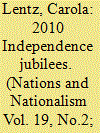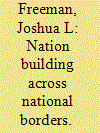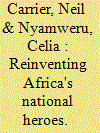|
|
|
Sort Order |
|
|
|
Items / Page
|
|
|
|
|
|
|
| Srl | Item |
| 1 |
ID:
120366


|
|
|
|
|
| Publication |
2013.
|
| Summary/Abstract |
In 2010, as many as seventeen African states celebrated their independence jubilees. The debates surrounding the organisation of these celebrations, and the imagery and performances they employed, reflect the fault lines with which African nation-building has to contend, such as competing political orientations as well as religious, regional and ethnic diversity. The celebrations represented constitutive and cathartic moments of nation-building, aiming to enhance citizens' emotional attachments to the country and inviting to remember, re-enact and re-redefine national history. They became a forum of debate about what should constitute the norms and values that make-up national identity and, in the interstices of official ceremonies, provided space for the articulation of new demands for public recognition. A study of the independence celebrations thus allows us to explore contested processes of nation-building and images of nationhood and to study the role of ritual and performance in the (re)production of nations.
|
|
|
|
|
|
|
|
|
|
|
|
|
|
|
|
| 2 |
ID:
177586


|
|
|
|
|
| Summary/Abstract |
The process of nation building often entails the articulation of communal heroes. This paper argues that the elevation of such heroes is particularly significant for minority nations divided between multiple states. The project of building the Uyghur nation, carried out across the borders of three twentieth-century socialist states, offers a unique opportunity for examining this phenomenon. In particular, the Uyghur case offers insight into the many minority communities whose nation building process was linked to twentieth-century socialism. This paper traces the posthumous reputation of Sadir Palwan, a nineteenth-century resistance fighter against the Qing empire who in the twentieth century was reinterpreted as a Uyghur national hero. Drawing on poetry, fiction, journal articles, and textbooks, the paper demonstrates that the project of articulating a heroic canon allowed Uyghur intellectuals to work across state borders as they shaped an identity for their nation outside the nation-state framework.
|
|
|
|
|
|
|
|
|
|
|
|
|
|
|
|
| 3 |
ID:
147816


|
|
|
|
|
| Summary/Abstract |
A nation's heroes are rarely fixed and are frequently reassessed and reinterpreted by new generations. In the case of a number of African countries, the very masculine liberation heroes of yesteryear often prove divisive, emerging from very fraught histories. In this context, there are moves to broaden the pantheon of heroes and make history more inclusive. In Kenya, where the contested history of Mau Mau provides several heroes, Mekatilili wa Menza, a female figure from the coast who played a significant role in Giriama resistance against the British in 1913, has emerged as a national heroine. The article introduces this historical figure using published sources, and then traces the historical arc of her memorialization and evocation from post-Independence praise as a feminist icon to her recent elevation to the Kenyan pantheon of national heroes and heroines. In doing so, it illustrates the ways in which her story is being retold on the coast by Giriama organizations that have made her a central figure in local heritage movements. Finally, in the changed context of devolved Kenya since the 2010 constitution came into force after the 2013 election, this article shows how her story gained further salience as coastal politicians claimed her memory for regional goals. It argues that while figures such as Mekatilili may appear less divisive than Mau Mau, how their history is told and used is equally political.
|
|
|
|
|
|
|
|
|
|
|
|
|
|
|
|
|
|
|
|
|